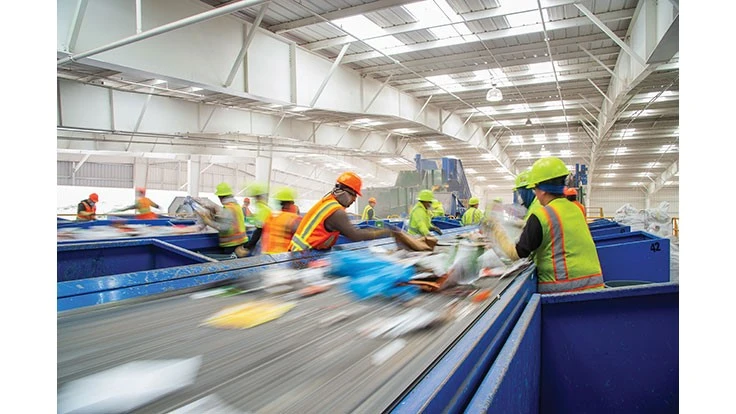
After approval from the county board of commissioners last week, the Isabella County material recovery facility (MRF), Michigan, will increase its processing fee from $60 to $85 per ton for commodities with a contamination level higher than 10 percent, effective April 2019.
“The scrap ban from China had a ripple effect throughout the recycling industry. Not just in this country, but around the world,” MRF director Jake Borton tells the board. “That’s where a lot of this started to develop. The intent is to try and recoup some of the operating costs that we’re losing through the facility.”
Borton reports the MRF failed to break even or make a profit last year. The MRF lost $145,000 in processing costs last year, he says.
The Michigan MRF accepts material from large waste haulers, including Republic Services and Waste Management, serving the Central Michigan region. At the MRF, workers manually sort material—cardboard, glass, plastic, and metal—and remove contamination, or materials such as plastic bags, before recyclables are baled and sold to regional mills. Borton adds haulers bring in material from as far as two hours away.
Dumpster Diving
At the Michigan MRF, a worker will now assess each individual load as it comes across the scale into the facility, Borton says.
“Just with them opening the door, a lot of times we’ll see whether there’s much contamination there,” Borton says. “I hate to say that we have to go dumpster diving, but that’s exactly what we have to do.”
He adds, “We’re going to be pulling drivers out of the truck. You can see what’s been tipped out. By a visual inspection, if it does look like we’re over that 10 percent residual, we’re going to be notifying them that it’s going in at 85 a ton rather than 65 a ton.”
Borton doesn’t think the fees will deter waste haulers from bringing material to the MRF. He says Waste Management, for example, has a facility in Saginaw, Michigan, but most of the waste gets transferred to Detroit, Michigan, for processing. He believes haulers will still bring material to the Isabella County MRF to keep transportation costs down.
MRFs are assessing processing fees across the country and major haulers “are well aware,” Borton says. During his presentation to the board, he provided a range of processing fees across the country, from a $60 per ton processing fee in Delta County to a $120 processing fee at Republic Services’ San Juan, Puerto Rico, plant.
“Looking at all the other ones across the country, I try to set reasonable fees that I think will fall in line,” Borton says. “I can’t tell you these numbers are going to stay set in stone. If we continue to see market deterioration, this is something we may have to revisit.”
Cleaning up the stream
Borton says the MRF is working with waste haulers to clean up the commingled recyclables. He says a load recently came in with scrap plastic. Often, when workers go “digging through the material” they can find the source of where the contamination or nonrecyclable material is coming from and report back to the hauler.
“We can go back to that hauler and say this is where we expect that it is coming from,” Borton says. “We notify the hauler where we think it’s coming from. You can bet they’re going to have someone go and talk to them and say we’re going to increase your fees if you’re not doing your job as well.”
He adds, “It’s going to be communication with my staff and the major haulers. The biggest thing is trying to clean up the stream and make sure we’re getting a clean product to be able to recycle. By getting a cleaner product, we’ll hopefully be able to speed up our processing as well.”
Latest from Waste Today
- Terex Ecotec names Finlay Eastern as NA Dealer of the Year
- NWRA, SWANA partner to address lithium-ion batteries
- Corinth, Texas, renews waste contract with CWD
- Ohio EPA helps fund C&D debris cleanup at former Crest Rubber Co. site
- Montana Renewables receives loan for SAF facility expansion
- Yolo County Central Landfill celebrates mattress recycling milestone
- AEPW releases new mechanical recycling ‘playbook’
- Meridian Waste acquires NC hauling firm





